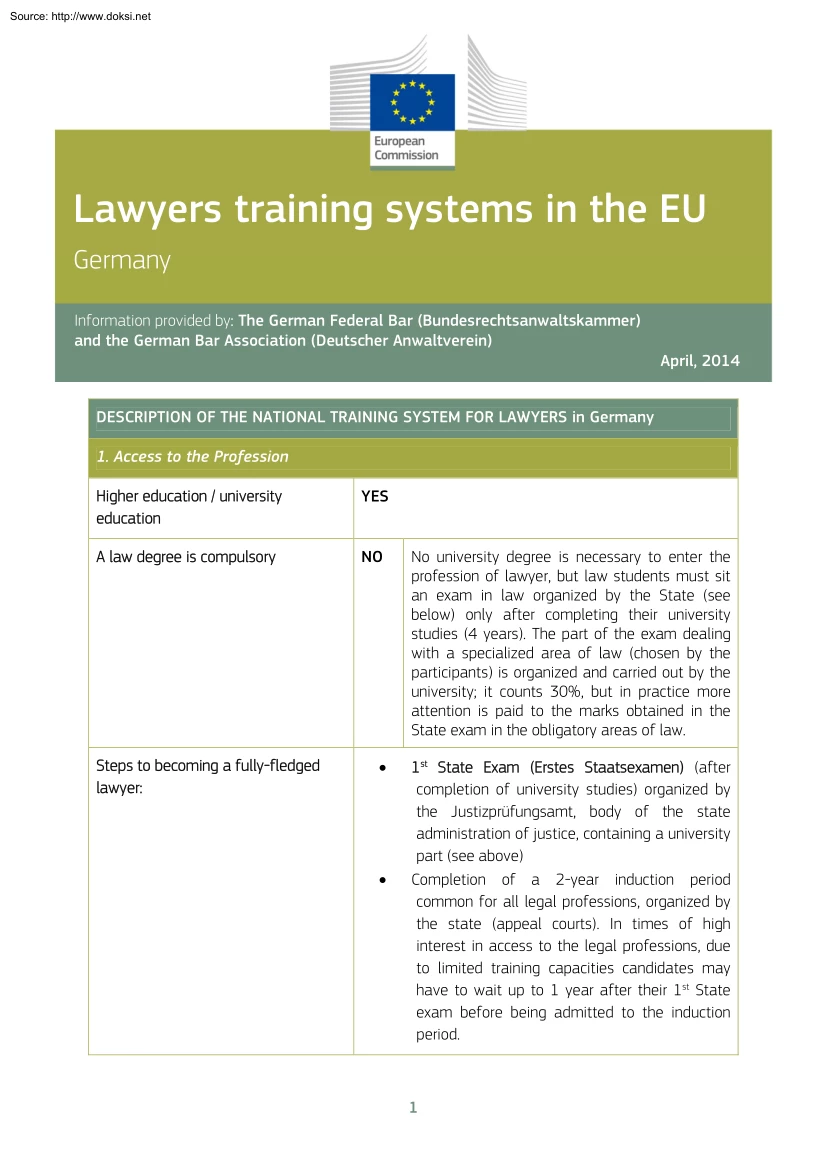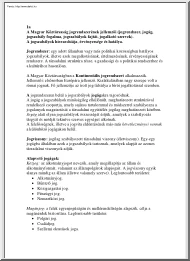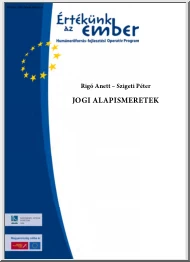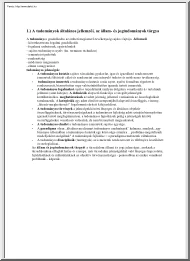Datasheet
Year, pagecount:2014, 6 page(s)
Language:English
Downloads:2
Uploaded:June 10, 2019
Size:603 KB
Institution:
-
Comments:
Attachment:-
Download in PDF:Please log in!
Comments
No comments yet. You can be the first!Most popular documents in this category
Content extract
Source: http://www.doksinet Lawyers training systems in the EU Germany Information provided by: The German Federal Bar (Bundesrechtsanwaltskammer) and the German Bar Association (Deutscher Anwaltverein) April, 2014 DESCRIPTION OF THE NATIONAL TRAINING SYSTEM FOR LAWYERS in Germany 1. Access to the Profession Higher education / university education YES A law degree is compulsory NO No university degree is necessary to enter the profession of lawyer, but law students must sit an exam in law organized by the State (see below) only after completing their university studies (4 years). The part of the exam dealing with a specialized area of law (chosen by the participants) is organized and carried out by the university; it counts 30%, but in practice more attention is paid to the marks obtained in the State exam in the obligatory areas of law. • 1st State Exam (Erstes Staatsexamen) (after completion of university studies) organized by the Justizprüfungsamt, body of the state
administration of justice, containing a university part (see above) Completion of a 2-year induction period common for all legal professions, organized by the state (appeal courts). In times of high interest in access to the legal professions, due to limited training capacities candidates may have to wait up to 1 year after their 1st State exam before being admitted to the induction period. Steps to becoming a fully-fledged lawyer: • 1 Source: http://www.doksinet Country: Germany • • • 2nd State Exam (Zweites Staatsexamen), organized by the Justizprüfungsamt Registration with the Bar “Morgenbesser” applicants, but they must hold the equivalent qualifications In Germany there is no law degree like in other countries, but university studies must be carried out and at the end of the study period the student must graduate in a special field. But this exam counts only 30 %.To become a fully fledged lawyer the candidates must take the 1st State Exam and later on the 2nd
State Exam. The standard period of university studies, including the 1st State Examination, 9 semesters (4 1/2 years). The written part of the 1st State Examination is the more difficult one with failure rates of up to 30%. It consists almost exclusively in solving legally difficult cases (mainly with substantial law) presented as a brief story. After passing successfully the 1st State Examination, the candidate has to undertake a two-year legal traineeship (“Referendariat”), which is basically the same for all future legal professions. The traineeship is organized and mainly financed by the Federal States. After completion of the legal traineeship, the candidate must take the 2nd State Examination. The failure rate is far less than in the 1st State Examination. The written part consists of drafting judgments, accusations, letters of lawyers in legal procedures or contract drafts for legally challenging cases presented in the form of short acts. After passing successfully the 2nd
State Exam, the trainee may become a fully-fledged lawyer. Alternative routes to the profession: There are no alternative routes to the profession. 2. Training during induction period Is there an induction period? YES 16 Federal States, each one has its own legal basis with differences mainly as to the length of the parts spent at different professions. 2 Source: http://www.doksinet Country: Germany Compulsory YES Set length: 2 years (“Referendariat”) Types of structures responsible for organising induction training • Bar (cooperates with appeal court in organizing the part dealing with the profession of lawyers) • Public Authority (appeal courts organize the two-year induction period after the 1st State Exam) Form of induction training • Law training with specific curriculum common to all trainee lawyers • Training on non-legal professional skills • Training on legal professional skills • Numerous theoretical courses to be undertaken Entrance exam /
check before induction period YES Candidates must take the 1st State Exam before commencing the induction period. Set curriculum during induction period YES Every Federal State has its own curriculum for trainee lawyers. Specificities regarding EU law and linguistic training: YES Legal basis: The German Judiciary Act Deutsches Richtergsetz: In section 5a (2), 3rd sentence it is stipulated that during the course of studies “Compulsory subjects shall comprise the core areas of civil law, criminal law, public law and the law of procedure, including the links with European law [.]” As far as the induction period is concerned, it depends on the State where the candidate is doing his/her induction period. 1rst State Exam: The Federal States are responsible for the content of the Examination but in all of them basics of EU law are part of the Examination. 2nd State Exam: In all Federal States the Examination includes basic knowledge of EU law (EU law aspects in civil, Criminal and
Administrative law) Generally, at least the last 3 months of the induction period (area of specialization) can be selected to cover EU law. 3 Source: http://www.doksinet Country: Germany Induction period divided into different stages YES The 2-year period consists of 5 parts of training on the job of at least 3 months each: training with a civil law judge, training with a prosecutor (or criminal law judge), training in an administration office, at least 9 months of training with a lawyer, training upon candidate’s personal choice. The training on the job is complemented by theoretical courses, concentrating mostly on procedural or professional law, of at least half -day per week. Post-induction period assessment/exam YES At the end of the induction period (18-21 months after the beginning) the candidate must sit a written exam and at the end of the induction period an oral exam. Both parts of the exam are organized and carried out by the Justizprüfungsamt. The
Justizprüfungsamt is the state authority which is competent for all exams a law student or a Referendar (junior lawyer/trainee) has to pass. 3. Continuous training system Differentiation between continuous training / specialisation training YES Obligations regarding continuous training / specialization training Compulsory training obligations as decided by Federal law (The Federal Lawyers’ Act (§ 43a (4) – In German: Bundesrechtsanwaltsordnung (BRAO) and in § 15 of the Fachanwaltsordnung (FAO)) YES Obligations regarding learning foreign languages There are no obligations, but foreign language courses are included in the university curricula. Obligations regarding EU law content in relation to continuous / specialization training Knowledge of EU law is necessary in order to specialize as “Fachanwalt” (specialised lawyer) (see § 2 (3) Fachanwaltsordnung (FAO)). EU law is included in training obligations of “Fachanwälte” (at least 10 hours per year). There are
also a lot of courses including EU law context, e.g family law, inheritance law, tax law, distribution law, foreclosure, drafting of contracts etc. Legal basis: • Bundesrechtsanwaltsordnung (BRAO) YES 4 Source: http://www.doksinet Country: Germany • Fachanwaltsordnung (FAO) • Continuous training: § 43a (6) BRAO • EU law training: §§ 14 ff. FAO (eg § 14m FAO) The Bundesrechtsanwaltsordnung (BRAO) rules all questions concerning lawyers in general; whilst the Fachanwaltsordnung (FAO) sets out rules on the specialization of lawyers and on how a lawyer must be qualified, when he wants to become a lawyer who is entitled to be called a specialist (“Fachanwalt”). 4. Accreditation systems and training providers Possibility for accreditation There is no formal accreditation system in Germany. Therefore, there are a lot of providers, which offer training courses. Courses of providers are accepted when the courses correspond to the criteria according to the
Fachanwaltsordnung (the content and the time frame must be fulfilled). Number of training providers offering continuous training activities The Bar does not have the exact figures at its disposal concerning training providers in Germany. It is possible that there are more than 50 training providers. Type of training providers developing accredited continuous training activities • • • • • Bar Organisation managed or established by the Bar private commercial training provider private or public non-for-profit training provider (see above, “Possibility of accreditation” section: the providers do not need accreditation) Number of training providers organizing training activities in preparation for specialization The number of training providers cannot be indicated because it is not known how much training providers exist in Germany. Type of training providers developing accredited training activities in preparation for specialization We have no formal accreditation,
but training providers are: • Bars and Bar Associations • Deutsches Anwaltsinstitut (DAI), connected to the German Federal Bar (Bundesrechtsanwaltskammer - BRAK) 5 Source: http://www.doksinet Country: Germany • • • Deutsche AnwaltAkademie (DAA), connected to the German Bar Association (Deutscher Anwaltverein – DAV) Private training providers Fachhochschulen and law schools Activities and methods Type of training activities accepted under the obligations of continuous or specialization training • • • • • • • • Attending face to face training sessions Completing distance training sessions Completing e-learning modules Watching a webinar Completing blended learning activities Attending training conferences Participating in training activities as trainer or teacher Writing / Publishing Participation in training activities in another Member State: Yes, it counts towards training obligations 5. Supervision of training activities Organisations involved
in supervising continuous training activities The regional Bars, the DAI (Deutsches Anwaltsinstitut) and the DAA (Deutsche AnwaltAkademie) are the main training providers. Regional Bars are responsible for the continuous training of specialized lawyers (“Fachanwälte”) Supervision process Specialised lawyers (“Fachanwälte”) must submit proof (certificate of participation) that they have participated in at least 10 hours of training per year. The regional bars check whether the training meets the specified requirements. Only if this is the case, the lawyer is allowed to continue bearing the title of “Fachanwalt” (Specialised lawyer). Source: Pilot Project - European Judicial Training: "Lot 2 – Study on the state of play of lawyers training in EU law", carried out by the Council of Bars and Law Societies of Europe (CCBE) and the European Institute of Public Administration (EIPA) 6
administration of justice, containing a university part (see above) Completion of a 2-year induction period common for all legal professions, organized by the state (appeal courts). In times of high interest in access to the legal professions, due to limited training capacities candidates may have to wait up to 1 year after their 1st State exam before being admitted to the induction period. Steps to becoming a fully-fledged lawyer: • 1 Source: http://www.doksinet Country: Germany • • • 2nd State Exam (Zweites Staatsexamen), organized by the Justizprüfungsamt Registration with the Bar “Morgenbesser” applicants, but they must hold the equivalent qualifications In Germany there is no law degree like in other countries, but university studies must be carried out and at the end of the study period the student must graduate in a special field. But this exam counts only 30 %.To become a fully fledged lawyer the candidates must take the 1st State Exam and later on the 2nd
State Exam. The standard period of university studies, including the 1st State Examination, 9 semesters (4 1/2 years). The written part of the 1st State Examination is the more difficult one with failure rates of up to 30%. It consists almost exclusively in solving legally difficult cases (mainly with substantial law) presented as a brief story. After passing successfully the 1st State Examination, the candidate has to undertake a two-year legal traineeship (“Referendariat”), which is basically the same for all future legal professions. The traineeship is organized and mainly financed by the Federal States. After completion of the legal traineeship, the candidate must take the 2nd State Examination. The failure rate is far less than in the 1st State Examination. The written part consists of drafting judgments, accusations, letters of lawyers in legal procedures or contract drafts for legally challenging cases presented in the form of short acts. After passing successfully the 2nd
State Exam, the trainee may become a fully-fledged lawyer. Alternative routes to the profession: There are no alternative routes to the profession. 2. Training during induction period Is there an induction period? YES 16 Federal States, each one has its own legal basis with differences mainly as to the length of the parts spent at different professions. 2 Source: http://www.doksinet Country: Germany Compulsory YES Set length: 2 years (“Referendariat”) Types of structures responsible for organising induction training • Bar (cooperates with appeal court in organizing the part dealing with the profession of lawyers) • Public Authority (appeal courts organize the two-year induction period after the 1st State Exam) Form of induction training • Law training with specific curriculum common to all trainee lawyers • Training on non-legal professional skills • Training on legal professional skills • Numerous theoretical courses to be undertaken Entrance exam /
check before induction period YES Candidates must take the 1st State Exam before commencing the induction period. Set curriculum during induction period YES Every Federal State has its own curriculum for trainee lawyers. Specificities regarding EU law and linguistic training: YES Legal basis: The German Judiciary Act Deutsches Richtergsetz: In section 5a (2), 3rd sentence it is stipulated that during the course of studies “Compulsory subjects shall comprise the core areas of civil law, criminal law, public law and the law of procedure, including the links with European law [.]” As far as the induction period is concerned, it depends on the State where the candidate is doing his/her induction period. 1rst State Exam: The Federal States are responsible for the content of the Examination but in all of them basics of EU law are part of the Examination. 2nd State Exam: In all Federal States the Examination includes basic knowledge of EU law (EU law aspects in civil, Criminal and
Administrative law) Generally, at least the last 3 months of the induction period (area of specialization) can be selected to cover EU law. 3 Source: http://www.doksinet Country: Germany Induction period divided into different stages YES The 2-year period consists of 5 parts of training on the job of at least 3 months each: training with a civil law judge, training with a prosecutor (or criminal law judge), training in an administration office, at least 9 months of training with a lawyer, training upon candidate’s personal choice. The training on the job is complemented by theoretical courses, concentrating mostly on procedural or professional law, of at least half -day per week. Post-induction period assessment/exam YES At the end of the induction period (18-21 months after the beginning) the candidate must sit a written exam and at the end of the induction period an oral exam. Both parts of the exam are organized and carried out by the Justizprüfungsamt. The
Justizprüfungsamt is the state authority which is competent for all exams a law student or a Referendar (junior lawyer/trainee) has to pass. 3. Continuous training system Differentiation between continuous training / specialisation training YES Obligations regarding continuous training / specialization training Compulsory training obligations as decided by Federal law (The Federal Lawyers’ Act (§ 43a (4) – In German: Bundesrechtsanwaltsordnung (BRAO) and in § 15 of the Fachanwaltsordnung (FAO)) YES Obligations regarding learning foreign languages There are no obligations, but foreign language courses are included in the university curricula. Obligations regarding EU law content in relation to continuous / specialization training Knowledge of EU law is necessary in order to specialize as “Fachanwalt” (specialised lawyer) (see § 2 (3) Fachanwaltsordnung (FAO)). EU law is included in training obligations of “Fachanwälte” (at least 10 hours per year). There are
also a lot of courses including EU law context, e.g family law, inheritance law, tax law, distribution law, foreclosure, drafting of contracts etc. Legal basis: • Bundesrechtsanwaltsordnung (BRAO) YES 4 Source: http://www.doksinet Country: Germany • Fachanwaltsordnung (FAO) • Continuous training: § 43a (6) BRAO • EU law training: §§ 14 ff. FAO (eg § 14m FAO) The Bundesrechtsanwaltsordnung (BRAO) rules all questions concerning lawyers in general; whilst the Fachanwaltsordnung (FAO) sets out rules on the specialization of lawyers and on how a lawyer must be qualified, when he wants to become a lawyer who is entitled to be called a specialist (“Fachanwalt”). 4. Accreditation systems and training providers Possibility for accreditation There is no formal accreditation system in Germany. Therefore, there are a lot of providers, which offer training courses. Courses of providers are accepted when the courses correspond to the criteria according to the
Fachanwaltsordnung (the content and the time frame must be fulfilled). Number of training providers offering continuous training activities The Bar does not have the exact figures at its disposal concerning training providers in Germany. It is possible that there are more than 50 training providers. Type of training providers developing accredited continuous training activities • • • • • Bar Organisation managed or established by the Bar private commercial training provider private or public non-for-profit training provider (see above, “Possibility of accreditation” section: the providers do not need accreditation) Number of training providers organizing training activities in preparation for specialization The number of training providers cannot be indicated because it is not known how much training providers exist in Germany. Type of training providers developing accredited training activities in preparation for specialization We have no formal accreditation,
but training providers are: • Bars and Bar Associations • Deutsches Anwaltsinstitut (DAI), connected to the German Federal Bar (Bundesrechtsanwaltskammer - BRAK) 5 Source: http://www.doksinet Country: Germany • • • Deutsche AnwaltAkademie (DAA), connected to the German Bar Association (Deutscher Anwaltverein – DAV) Private training providers Fachhochschulen and law schools Activities and methods Type of training activities accepted under the obligations of continuous or specialization training • • • • • • • • Attending face to face training sessions Completing distance training sessions Completing e-learning modules Watching a webinar Completing blended learning activities Attending training conferences Participating in training activities as trainer or teacher Writing / Publishing Participation in training activities in another Member State: Yes, it counts towards training obligations 5. Supervision of training activities Organisations involved
in supervising continuous training activities The regional Bars, the DAI (Deutsches Anwaltsinstitut) and the DAA (Deutsche AnwaltAkademie) are the main training providers. Regional Bars are responsible for the continuous training of specialized lawyers (“Fachanwälte”) Supervision process Specialised lawyers (“Fachanwälte”) must submit proof (certificate of participation) that they have participated in at least 10 hours of training per year. The regional bars check whether the training meets the specified requirements. Only if this is the case, the lawyer is allowed to continue bearing the title of “Fachanwalt” (Specialised lawyer). Source: Pilot Project - European Judicial Training: "Lot 2 – Study on the state of play of lawyers training in EU law", carried out by the Council of Bars and Law Societies of Europe (CCBE) and the European Institute of Public Administration (EIPA) 6





